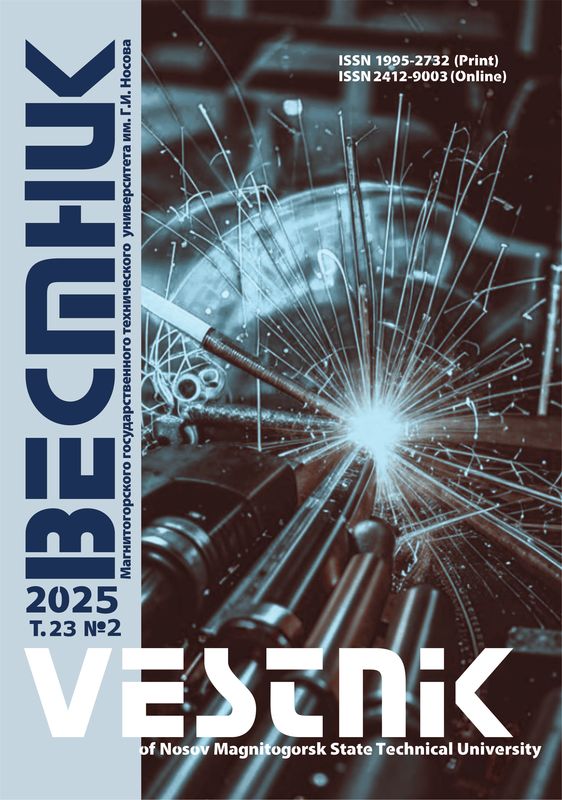DOI: 10.18503/1995-2732-2024-22-1-114-121
Abstract
With the development and introduction of elements of Industry 4.0 into production systems, and in particular the digitalization of production, digital twins and augmented reality systems, the task of an organic introduction of digital technologies into production systems becomes more and more relevant. In parallel, the issue under consideration is attributed to feasibility of introducing new technologies into the initial architecture of the system being implemented and its adaptation to specific features of production processes and premises, as well as the organizational structure of the enterprise. Taking into account these aspects, we can talk about the problem of managerial decision-making, when planning and implementing the introduction of new systems as a key task. This paper presents a modeled situation of the introduction of a barcoding system and instant printing of the required amount of labeling, when packing finished products at a textile industry enterprise. It is possible to pre-adjust the system before its start, temporarily interrupting a production process, which will cause losses associated with waiting. Failure to adjust the system puts at risk the operability of the system as a whole, increasing the risk of a sudden system failure and shutdown of the production process. To reduce risks, it is possible to carry out a system verification procedure, which will entail additional financial costs and not guarantee the identification of all the flaws and errors of the system. A decision-maker needs to choose the optimal strategy for the organic implementation of the new system in the production process. The paper proposes a decision-making model on the need to adjust the electronic tracking system of product batches implemented at the enterprise and determines the optimal behavior of the decision-maker in the simulated situation. The scope of the model is not limited to the industry and field of activity of the enterprise and can be used when it is necessary to make a decision on the introduction of innovations into the production process.
Keywords
decision tree, Bayes formula, optimization, production processes, quality management, lean manufacturing, barcoding system, management decision-making technology, production organization, dispatching of production processes
For citation
Nazarevich S.A., Sviridenko A.V. A Decision-Making Model Based on Empirical Data. Vestnik Magnitogorskogo Gosudarstvennogo Tekhnicheskogo Universiteta im. G.I. Nosova [Vestnik of Nosov Magnitogorsk State Technical University]. 2024, vol. 22, no. 1, pp. 114-121. https://doi.org/10.18503/1995-2732-2024-22-1-114-121
1. Kovalenko V.P., Sokolyuk V.M. Technology of decision-making. Vestnik Polesskogo gosudarstvennogo universiteta. Seriya prirodovedcheskikh nauk [Bulletin of Polessky State University. Series in Natural Sciences]. 2008;(2):52-58. (In Russ.)
2. Vorobyeva M.V. Analysis of methods of multi-criteria decision-making. Regionalnaya i otraslevaya ekonomika [Regional and Sectoral Economics]. 2022;(1):24-28. (In Russ.)
3. Gladkova Yu.V., Gladkov V.P. Stages of managerial decision-making. Vestnik Permskogo natsionalnogo issledovatelskogo politekhnicheskogo universiteta. Elektrotekhnika, informatsionnye tekhnologii, sistemy upravleniya [Bulletin of PNRPU. Electrical Engineering, Information Technology, Control Systems]. 2010;(4):39-44. (In Russ.)
4. Antonov V.V., Konev K.A., Kulikov G.G. Transformation of the decision support system model for typical situations using intellectual and analytical methods. Vestnik YuUrGU. Seriya: Kompyuternye tekhnologii, upravlenie, radioelektronika [Bulletin of SUSU. Series: Computer Technology, Control, Radio Electronics]. 2021;(3):14-25. (In Russ.)
5. Mochammad Ridwan Ristyawan, Putro U., Siallagan M. Decision making mechanism in resource based theory: A literature review, synthesis, and future research. Cogent Business & Management. 2023;(10): 2247217.
6. Dosuzheva E.E., Kirillov Yu.V. Rational approach to managerial decision-making. Idei i idealy [Ideas and Ideals]. 2014;(1(19)):89-98. (In Russ.)
7. Gambarov Turkhan Rizvan Ogly. A model of a step-by-step process of making a rational managerial decision. Azimut nauchnykh issledovaniy: ekonomika i upravlenie [Azimuth of Scientific Research: Economics and Management]. 2019;8(1(26)):119-122. (In Russ.)
8. Ayvazyan S.A., Enyukov I.S., Meshalkin L.D. Prikladnaya statistika. Osnovy modelirovaniya i pervichnaya obrabotka dannykh [Applied statistics. Fundamentals of modeling and primary data processing]. Moscow: Finansy i statistika, 1983. (In Russ.)
9. Vatutin V.A., Ivchenko G.I., Medvedev Yu.I. et al. Teoriya veroyatnostey i matematicheskaya statistika v zadachakh: ucheb. posobie [Probability theory and mathematical statistics in problems: study guide]. Moscow: Drofa, 2005. (In Russ.)
10. Gmurman V.E. Teoriya veroyatnostey i matematicheskaya statistika: ucheb. posobie [Probability theory and mathematical statistics: study guide]. Moscow: Vysshee obrazovanie, 2007. (In Russ.)












